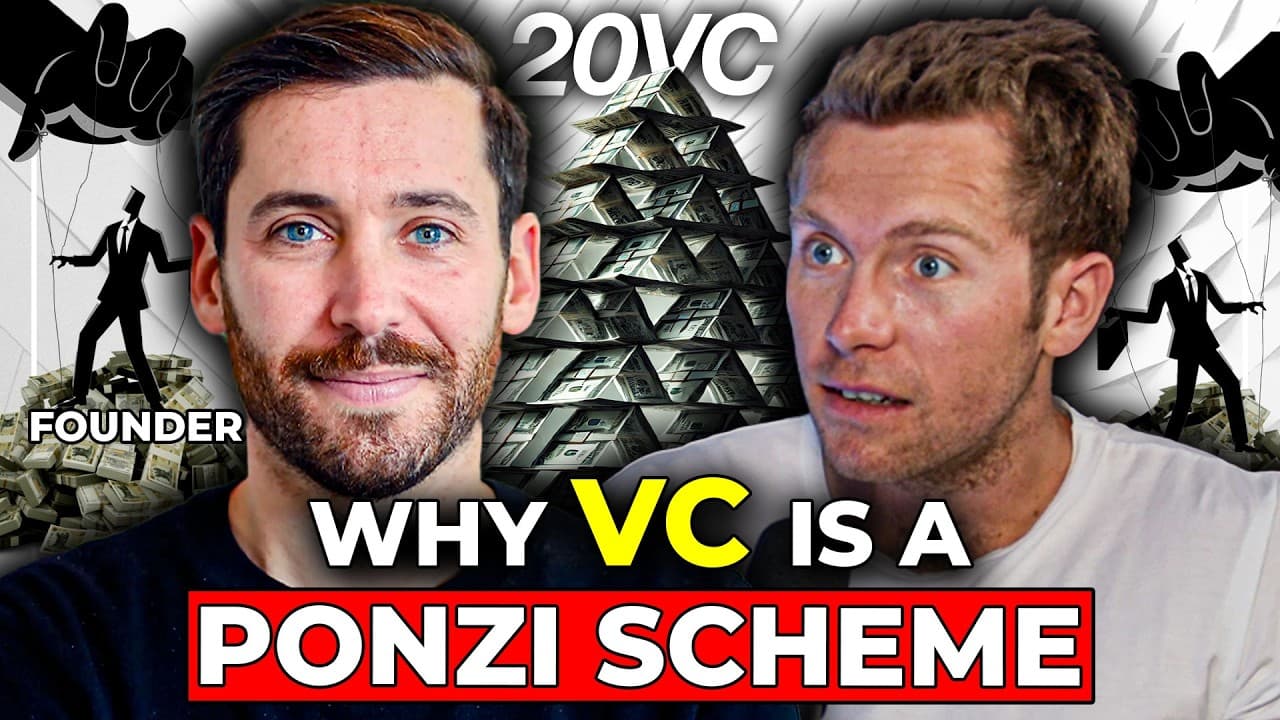Nicholas Chirls: Why Big VCs Ruin Startups, VC is a Ponzi Scheme Today & Most VCs are Bankers |E1198
10 Sep 2024 (over 1 year ago)

Intro (0s)
- Junior partners at large venture capital firms are incentivized to prioritize the rapid deployment of capital over maximizing returns. (5s)
- Companies that necessitate substantial capital injections, such as those developing foundation models, are highly appealing to large venture capital firms. (10s)
- The prevailing business model for significant venture capital firms centers around securing and deploying substantial funding as swiftly as possible, followed by further fundraising rounds. (30s)
Starting Asylum Ventures (1m20s)
- Asylum Ventures is a newly established venture capital firm with a fund size of $55 million. (2m9s)
- The firm aims to invest in early-stage companies by providing checks ranging from $500,000 to $2 million. (2m12s)
- Asylum Ventures positions itself as an alternative to larger venture capital firms, aiming to support founders and challenge the existing practices of these larger firms. (3m45s)
The Ponzi Scheme Structure of the Venture Capital Industry (4m19s)
- Private equity firms can take a significant amount of money out of a company, even if it goes bankrupt. (5m30s)
- Venture capital firms typically charge a 2% management fee for 10 years, regardless of the fund's performance, and take a 20% carried interest. (5m42s)
- The only sustainable competitive advantage for venture capital firms is to stand for something meaningful, which may not appeal to everyone, but will attract a dedicated group. (12m39s)
Multi-Stage Funds Are Tightening Margins for Pre-Seed Investors? (13m15s)
- Multi-stage funds have made it harder for pure seed players by increasing price and supply, which will likely lead to lower returns for seed funds. (13m53s)
- The most successful early-stage investments are in companies or markets that are currently overlooked by others. (14m39s)
- While legal agreements are in place, they don't always prevent issues, and building trust and open communication between founders and investors is crucial for long-term success. (29m23s)
Why Do Big VCs Favor Funding Capital Inefficiency? (36m18s)
- Large venture capital firms prefer to invest in companies that require significant capital, such as those in the artificial intelligence and defense technology sectors. (37m18s)
- The ideal investment for these firms is a company that needs billions of dollars in funding, allowing them to deploy capital quickly and raise subsequent funds. (37m21s)
- Junior partners at these firms are incentivized to prioritize the speed of investment deployment over the actual returns generated. (37m3s)
The Myth of VC Value-Add (46m43s)
- Venture capitalists (VCs) promoting their services as essential for a company's success is not supported by evidence. (47m9s)
- While VCs can provide valuable advice and support, their involvement does not guarantee a company's success or failure. (47m9s)
- There is a misalignment of incentives between VCs and founders, particularly in large firms, where VCs may prioritize raising large funds and achieving quick returns over building a sustainable business. (53m4s)
Raising Money as the Default Path for Today's Founders (55m5s)
- The dominant startup model is to raise money as the first step, even though building a company is challenging and potentially life-ruining. (55m12s)
- Building a startup is incredibly difficult and can lead to relationship breakdowns, founder disputes, divorces, and bankruptcies. (56m8s)
- Founders should be obsessed with their idea and driven to solve a problem, while investors should provide support and make the experience less difficult. (57m18s)
Quick-Fire Round (1h4m7s)
- The belief that the less institutional and less like a bank a venture capitalist is, the more likely they are to succeed in the next decade. (1h4m14s)
- Andy Weissman and Bryce Roberts are respected for thinking independently and going against the grain of large asset management firms. (1h4m46s)
- The most contrarian advice given to founders is to only start a company if absolutely necessary and to find a trustworthy co-founder or investor. (1h5m7s)